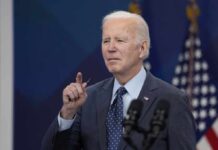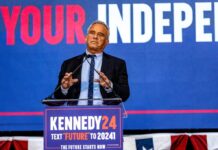
Hall of Fame basketball coach Phil Jackson has spoken out about why he hasn’t watched an NBA game in years, citing the league’s increasingly political nature. Jackson expressed his sentiments during a recent appearance on the Tetragrammaton podcast with renowned music producer Rick Rubin.
The legendary coach admitted that he started losing interest in the NBA during the 2020 bubble postseason experiment in Orlando. The bubble season occurred amidst the pandemic and, according to Jackson, was marked by a strong focus on political and social justice issues. The NBA allowed players to wear social justice messages on their jerseys and even painted “Black Lives Matter” on the court’s floor.
Phil Jackson says the NBA's obsession with woke politics is "turning people off."https://t.co/Edx9OXTtNC
— OutKick (@Outkick) April 22, 2023
Jackson voiced his disapproval in the podcast, saying, “They had things on their back like ‘Justice,’ I couldn’t watch that.” He went on to explain that he believes the league was trying to cater to a particular audience, unintentionally alienating other fans. “It was trying to cater to an audience or trying to bring a certain audience into play. And they didn’t know it was turning other people off.”
Jackson emphasized that sports should remain non-political. “People want to see sports as non-political. Politics stays out of the game. It doesn’t need to be there.” While some NBA players have pursued political careers, he pointed out that they have generally kept their politics separate from their athletic careers.
The celebrated coach’s remarks come at a time when the NBA has seen a decline in viewership, with ratings for the 2023 NBA All-Star game being particularly disappointing. Moreover, the league reportedly grapples with a challenging economic reality, cutting spending and limiting hiring to stay on track in 2023.
Jackson, who retired from coaching in 2016 with an astounding 11 NBA championships, has dedicated most of his life to basketball. His career saw him coach the Los Angeles Lakers and the Chicago Bulls to multiple championships. Given his extensive experience and contributions to the sport, Jackson’s critique of the NBA’s current trajectory holds significant weight.
NBA Commissioner Adam Silver has previously acknowledged the league’s focus on social justice messages. He stated that after the 2020 season, there would be a return to normalcy, with messages being delivered off the court. This move appears to have resonated with viewers somewhat, as more people tuned into the NBA playoffs first round in 2021 than at any time since 2014.
While the league remains committed to racial equality, it appears that fans, like Jackson, want to see sports as a realm free from political agendas. As the NBA navigates through these challenges, it will be crucial for the league to strike a balance between the wokism plaguing American culture and the expectations of its audience.













